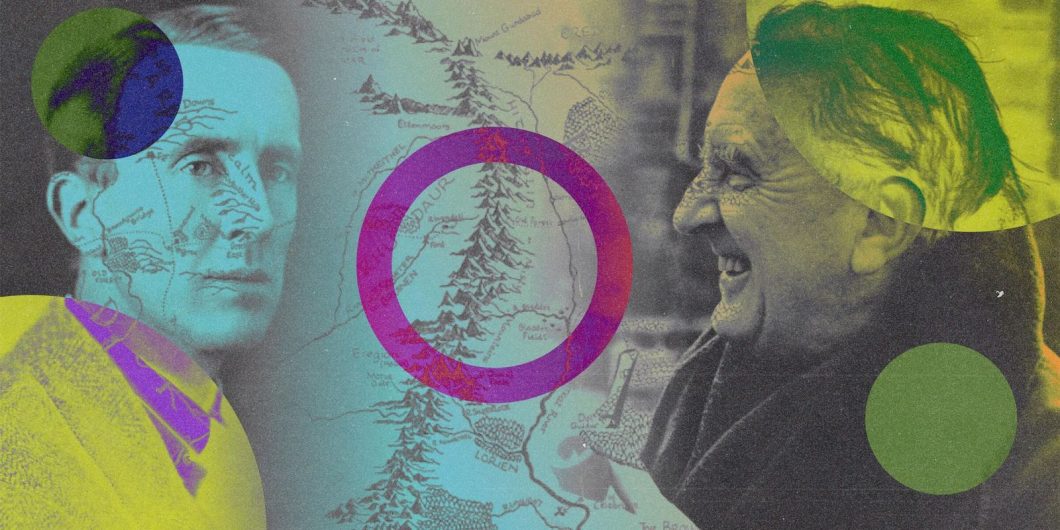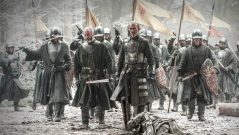Tolkien's Political Soulcraft
A friend told me that, watching The Lord of The Rings again on its 20th anniversary, it struck him that the movies are far more Christian than he had allowed before, that they translate visually Tolkien’s suggestion—Gandalf is like unto John the Baptist and Aragorn is a political image of Jesus Christ, the true king. Tolkien’s story unfolds as a spiritual journey—the reader is supposed to meditate on what it means to test souls and what it means to be truly human, which can be known only after all comfortable illusions are lost and all arrogance with them.
My friend has his children read Tolkien. Indeed, he has read the novels with them, adding to the enjoyment of the reading that of teaching about faith and freedom. This is a problem I, as a cultural critic run into fairly frequently. Parents ask me, what should they give their children to read or to watch? Can they achieve something worthwhile by such an education of the imagination? Would it come at the price of secluding their children from all their peers, who are deluged by a popular culture that shames decency and wit?
We know children should be kept away from sordid things; nowadays, this might take more effort than before, but it is worth it, since it means they will still be able to take seriously the innocent longing for justice and knowledge in their hearts. But precisely for that reason children must be taught about good and evil, about heroes and tyrants, about war and the dark passions of the heart from which it first arises. This is the purpose of The Lord of the Rings, the only famous story conservatives can point to as a common possession.
Tolkien Translated for Americans
But to be of any use, a possession must first be understood. Tolkien was not American, but English, and shared the 19th-century preoccupation with fairy tales and legends, which was a kind of answer to the Progressive rationalism of science, technology, and political ideology. In a time when a radical revolution was being promised every day, as disruption is in our times, Tolkien and others attempted a real revolution, a turning back to the origins, to remember man’s original and unsurpassable situation. The purpose was to dispel the illusion that man could remake even his own nature. Modern ideas were offered as a cure for the ignorance of “the dark ages”—fairy tales were, conversely, offered as a corrective for the inhuman desire to reduce humanity to non-human drives, instincts, or other material causes.
Furthermore, Tolkien wanted to effect a great reconciliation between past and present, between aristocracy and democracy. That children like and identify with the hobbits in his stories might be adequate evidence that they stand for democratic life before its encounter with aristocracy; that they admire the elves should suffice as evidence that they are a vision of aristocracy, purified, if you will, of cruelty. In his vision, manners and morality are identical, and poetry is the same as wisdom.
After the modern revolution that dispossessed aristocracy, it became possible to look back at the aristocratic past in terms of its highest aspirations, its unceasing concern with human greatness, of which we have evidence in so many ruins. We also have evidence of our admiration for aristocracy in our work to preserve their ruins, although we do not build or live like they did. Every heart that breaks at the ugliness of contemporary life gives testimony that Tolkien was right: we need to restore some parts of aristocracy in our own times. This would suggest, further, that we have forgiven the injustices of aristocracy, since we no longer suffer from them. We are satisfied that equality is just, but we do not know quite what to do with it or how to protect it.
Tolkien wanted to add to that admiration we have of the past, whence we get our love of fantasy, an education concerning character. Instead of letting democrats degenerate into tourists, sentimental types who don’t really care about anything—because care would inspire, indeed require, work—he wanted them to become worthy inheritors of the great European past of aristocracy. The connection would be Christianity, which humbles the proud, but can also elevate the humble.
Accordingly, the elven past is unusually beautiful and wise, but also the present of men and hobbits is unusually able and willing to learn. Even the dwarves, who have a unique arrogance built on technical power and love of wealth, are redeemed. Only a certain Christian disposition can explain this coming together of very different, potentially conflicting characters, the breaking of long habits in order to make new friends, and the overall absence of cruelty.
The Fellowship
This is the most civilized thing about Tolkien’s writing, which is not adequately appreciated—he leads his readers to the thought that politics is education. Education, in the highest sense, is conversation, which alone can make for a kind of equality between young and old, wise and unwise, and even the hard and the soft. This reminds us of the grand bargain of tradition, leaving something good behind in exchange for the reassurance that human affairs are somehow guided, protected by providence.
The Fellowship is weighted heavily against the old and the wise; really, only the future king Aragorn and the advisor Gandalf can be called both old and wise. Yet most of their younger fellows have some title to rule. They are not merely ordinary, although they represent the four races that make up the basic possibilities of work, wisdom, and wealth that Tolkien considers. The inclusive character of the fellowship, which is Tolkien’s basic idea of politics, the one to which he devotes most of his work, is evidence of divine love of all beings that have, if I may use the old-fashioned word, souls.
Of course, inclusiveness is not for its own sake. The fellowship is defined by a certain striving for nobility, hence the rejection of cruelty by the fellows. It is given to ordinary people to share in some way in the exploits of the great, as part of our political way of life, but the fellowship is available only to those who indeed strive, because they are naturally exceptional. Tolkien suggests that in each community some are touched by greatness, but they are often concealed in ordinary times, protected by common prejudice, you might say, from the difficulties of rule. Tolkien reveals a political crisis by degrees, to allow his characters to prepare, including by learning, for their work as rulers, since most of them have to become rulers.
Hobbits are not particularly smart or strong, acrobatic or enduring. They nevertheless have souls which expand to take in, somehow, the whole world available to experience and knowledge.
This is where Peter Jackson erred in parting ways with Tolkien. He did not introduce Americans to the glories of old world aristocracy, but instead democratized The Lord of the Rings, in order to please his audience. There is too much joking around and too much self-doubt and too much ignorance in his vision of the fellowship, which conceals entirely—from an audience too willing to be deceived—the fact that they are beholding princes and kings, not their childhood best friends and crushes.
Equality and inequality are mixed together in Tolkien’s political vision. All ensouled beings are threatened by a unique evil—that makes everyone equal. All communities have some great men, which makes them all able to contribute to the war to defend themselves. Common neediness and exceptional power both are needed if the fellowship is to have any success. Indeed, although the story’s events may seem at first somewhat random, eventually the unfolding catastrophe of Sauron’s invasion systematically reveals the difference between arrogant mediocrity and natural greatness.
That Small Thing, the Soul
I can only begin to show you what Tolkien wanted us to see in this brief essay and its companion piece, so I chose to look at the beginning, at the fellowship as a model for education. It reminds us that the old and wise can guide the young, given the political opportunity of a crisis and the political structure of democracy, as it emerges from aristocracy. The hobbits are as democratic as possible, they hardly know there is a world beyond their own experience; the elves appear as aristocratic as possible—they indeed seem eternal. They either have too little or too much knowledge, and neither kind is able to act on their own. Humans offer a better mix of democracy and aristocracy—they compete over rule openly, which makes for a lot of trouble and raises questions about justice and legitimacy, but they are also better able to judge, at least in a crisis, who is wise and who unwise. They learn to admire as they should in accordance with virtue, not pride, so that they mostly rule, even when they need advisors or friends who have spiritual authority.
Tolkien insisted on hobbits not merely because he was Christian and committed to democracy politically, but because they seem to reveal the possibilities of soul with least help from nature, since they are not particularly smart or strong, acrobatic or enduring. They nevertheless have souls which expand to take in, somehow, the whole world available to experience and knowledge. He splits them up so that some see the great world of politics and others confront the spiritual problem of corruption and faith, in order to give an account of both sides of our being, the relational and the hidden. In the latter two volumes, the great world of politics comes first, and only then do we see its spiritual implications, but in the first volume the order is reversed, to prepare us to take politics seriously as an education for serious men.
Tolkien assumed most of his readers would share in the hobbit ignorance of war, of great strife requiring and rewarding the greatest exertions; he takes them from a kind of terrestrial paradise and, by making them love beautiful things, for example, the noble elves, he plunges them into the suffering of a world no less troubled than our own. This seems to be his idea about how to teach children through drama, how to prepare them to become adults by imitating the concerns of adults.
Tolkien’s fear seems to have been that people would forget they have souls—that they would no longer listen to the deep longings for justice, love, and learning. His answer to the problem came from faith rather than despair, so he designed his very long story to do something far more ambitious than what we expect from very popular, but silly Disney or Marvel fairy tales: To educate the young to the search for wisdom and for the strength to do what wisdom indicates is necessary. He saw in the crisis of modernity one good thing, that we would lose our arrogant illusions and instead try to recover our souls and therefore our nature.



